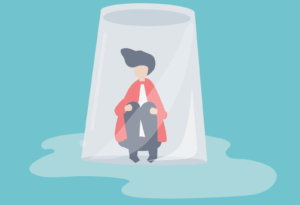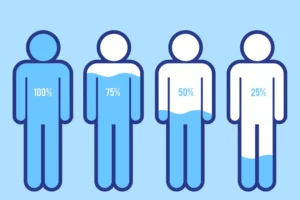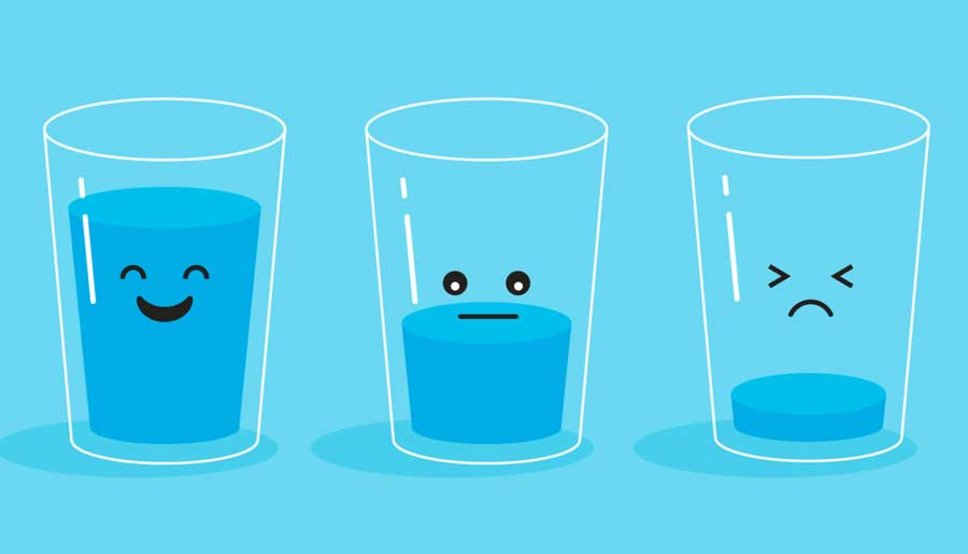Did you know that dehydration and anxiety are linked? It’s a scary reality, but it’s true. Dehydration can cause or worsen anxiety symptoms. If you’re struggling with anxiety, it’s important to be aware of this connection and take steps to ensure you’re staying hydrated. In this blog post, we’ll discuss the link between dehydration and anxiety, as well as some tips for staying hydrated.
Contents
What Is Anxiety?
We are not unfamiliar with the feeling of anxiety. It is a feeling of worry, nervousness, or unease about something with an uncertain outcome. We feel it before a big presentation at work or during a first date. While anxiety is a normal emotion that everyone experiences from time to time, some people experience it more severely. For these individuals, anxiety can be debilitating and have a significant impact on their day-to-day lives.
Anxiety disorders are the most common mental illness in the world, affecting millions of adults each year. Anxiety disorders come in many forms, including generalized anxiety disorder (GAD), panic disorder, social anxiety disorder, and more. While there are many different types of anxiety disorders, they all share one common symptom: fear.
How Does Anxiety Cause Dehydration?
 We now know that anxiety instills a sense of fear and apprehension. While these feelings are primarily psychological, the effects can be seen in our bodies too. Some of the most common ones include sweating, increased heart rate, and shallow breathing. However, a lesser-known side effect also includes dehydration.
We now know that anxiety instills a sense of fear and apprehension. While these feelings are primarily psychological, the effects can be seen in our bodies too. Some of the most common ones include sweating, increased heart rate, and shallow breathing. However, a lesser-known side effect also includes dehydration.
Simply put, dehydration means that our bodies are losing more water than we are taking in. This is a very common phenomenon that occurs within our bodies. But how does anxiety trigger this response? Let us understand these mechanisms.
- The most common explanation is that when we are anxious, our sympathetic nervous system is activated. This is the part of our nervous system that controls the “fight-or-flight” response. This activation results in an increase in heart rate and blood pressure as well as shallow breathing. All of these effects lead to a loss of water through sweating and respiration.
- Another physiological reasoning also suggests that dehydration causes anxiety. Dehydration can lead to an imbalance of electrolytes in the body, including sodium and potassium. This imbalance can cause feelings of dizziness, lightheaded-ness, and confusion – all of which can contribute to anxiety.
- When we have a lack of water in our bodies, it also causes our blood volume to decrease. This can lead to less oxygen being circulated to our brains, which can result in feelings of fatigue and brain fog. These are further harmful if one struggles with anxiety.
- Moreover, the link between dehydration and anxiety is bidirectional. This means that not only can anxiety cause dehydration, but dehydration can also cause anxiety. A study published in the Journal of Psychiatric Research found that even mild dehydration can cause an increase in anxiety symptoms.
The bottom line is that there is a link between dehydration and anxiety. If you’re struggling with anxiety, it’s important to be aware of this connection and take steps to ensure you’re staying hydrated.
What Are The Warning Signs?
 The very obvious sign of dehydration is thirst. However, by the time you feel thirsty, you’re already dehydrated. This is because thirst is a late sign of dehydration. Dehydration also manifests itself in various other forms. These include:
The very obvious sign of dehydration is thirst. However, by the time you feel thirsty, you’re already dehydrated. This is because thirst is a late sign of dehydration. Dehydration also manifests itself in various other forms. These include:
- Dryness: This can be seen in the form of dry skin, chapped lips, and dry eyes. This happens because there is a lack of moisture in the air.
- Increase in appetite: When you’re dehydrated, your body tries to hold on to whatever water it can get. This includes the water in your food. As a result, you may feel hungrier than usual.
- Bad breath: When your body doesn’t have enough water, it starts to break down glycogen (a type of sugar) for energy. This process produces ketones, which can lead to bad breath.
- Cramps: Because dehydration leads to a loss of electrolytes, you may experience cramps. These usually happen in the legs and arms.
- Headaches: A lack of fluids can cause headaches. This is because dehydration causes the blood vessels in your brain to constrict.
- Fatigue: Dehydration can cause your blood pressure to drop and make it difficult for your heart to pump blood. This can lead to fatigue.
- Dizziness: When you’re dehydrated, your blood pressure drops and your body doesn’t have enough fluid to maintain proper blood flow. This can lead to dizziness.
- Cognitive decline: Dehydration can cause your brain to shrink, which can lead to problems with thinking and memory. These can manifest in ways such as confusion, difficulty concentrating, and forgetfulness.
If you notice these signs in yourself or someone else, it’s important to take action immediately. Dehydration can lead to serious health problems, so it’s important to rehydrate as soon as possible!
What Are The Other Causes Of Dehydration?
Anxiety is just one of the many causes of dehydration. Others include:
Exercise: When you exercise, you sweat. This sweating can lead to dehydration if you don’t replace the fluids that you’ve lost.
Hot weather: Hot weather can cause you to sweat more than usual. This can lead to dehydration if you don’t replace the fluids that you’ve lost.
Illnesses: If you have an illness such as diarrhea, vomiting, or fever, you may lose more fluids than usual. This can lead to dehydration.
Improper diet: If your diet consists of excess salt, caffeine, or alcohol, you may be at risk for dehydration. These substances can lead to fluid loss.
Medications: Certain medications can cause you to urinate more frequently. This can lead to dehydration if you don’t replace the fluids that you’ve lost.
Pregnancy and breast-feeding: Pregnancy and breastfeeding can both lead to dehydration. This is because they cause you to lose more fluids than usual.
As you can see, there are many different causes of dehydration. These are only a few of the many explanations behind this consequence. It’s important to be aware of these so that you can take steps to prevent it!
How To Deal With It?
 Now that we know of all the possible causes of dehydration, what can we do to prevent it? There are a few things that you can do to prevent dehydration:
Now that we know of all the possible causes of dehydration, what can we do to prevent it? There are a few things that you can do to prevent dehydration:
- Drink plenty of fluids: This is the most obvious way to prevent dehydration. Make sure that you’re drinking enough water throughout the day. You can also experiment and include a variety of other nutritious and tasty beverages such as herbal teas, fresh juices, and soups.
- Eat foods that contain water: Incorporate more fruits and vegetables into your diet. These foods will help you stay hydrated because they contain water. These include watermelons, cucumbers, tomatoes, strawberries, and grapes.
- Monitor your urine: Pay attention to the color of your urine. If it’s dark yellow or brown, this is a sign that you’re dehydrated. Make sure to drink more fluids if you see this happening!
- Limit your intake of diuretics: As we mentioned before, diuretics can lead to dehydration. So it’s important to limit your intake of things such as caffeine, alcohol, and salt.
- Avoid extreme temperatures: If it’s extremely hot or cold outside, stay indoors where it’s more comfortable. And if you must go out in the heat, make sure to drink plenty of fluids and take breaks often.
- Carry a water bottle with you: It’s always a good idea to have a water bottle with you. This way, you can drink fluids even when you’re on the go!
- Keep track of your intake: If you’re worried about dehydration, it’s a good idea to keep track of how much fluid you’re taking in each day. This can help you ensure that you’re getting enough. You can do so by maintaining a food and water journal. There are also a variety of other tools such as apps and websites that can help you with this.
- Wear loose-fitting clothing: Wear clothing that won’t make you sweat more than necessary. Loose-fitting clothing is ideal because it allows your skin to breath and helps regulate your body temperature.
- See a doctor: At last, it is important to consult a doctor, especially if you think that your dehydration is due to an underlying medical condition. A doctor can help you determine the cause of your dehydration and provide an outline for your treatment. They may even provide treatment suggestions for your anxiety.
As you can see, there are many different ways to prevent dehydration. By following these tips, you can avoid this condition and its many consequences!
Conclusion
To conclude our blog post, we now know that dehydration can lead to anxiety. This is because dehydration can cause a variety of physical and mental symptoms that can trigger anxiety. But don’t worry, there are many things that you can do to prevent dehydration! Just make sure to follow the tips that we listed above. And if you think that your dehydration is due to an underlying medical condition, be sure to see a healthcare professional.
If you or someone you know is looking for psychological help, Therapy Mantra is here for you. We are the leading providers of online therapy and counseling. Our team of highly trained and experienced therapists can provide assistance at the most affordable rates. Contact us today to learn more about our services. You may also visit our website to book an online therapy session or download our free Android or iOS app for more information.


